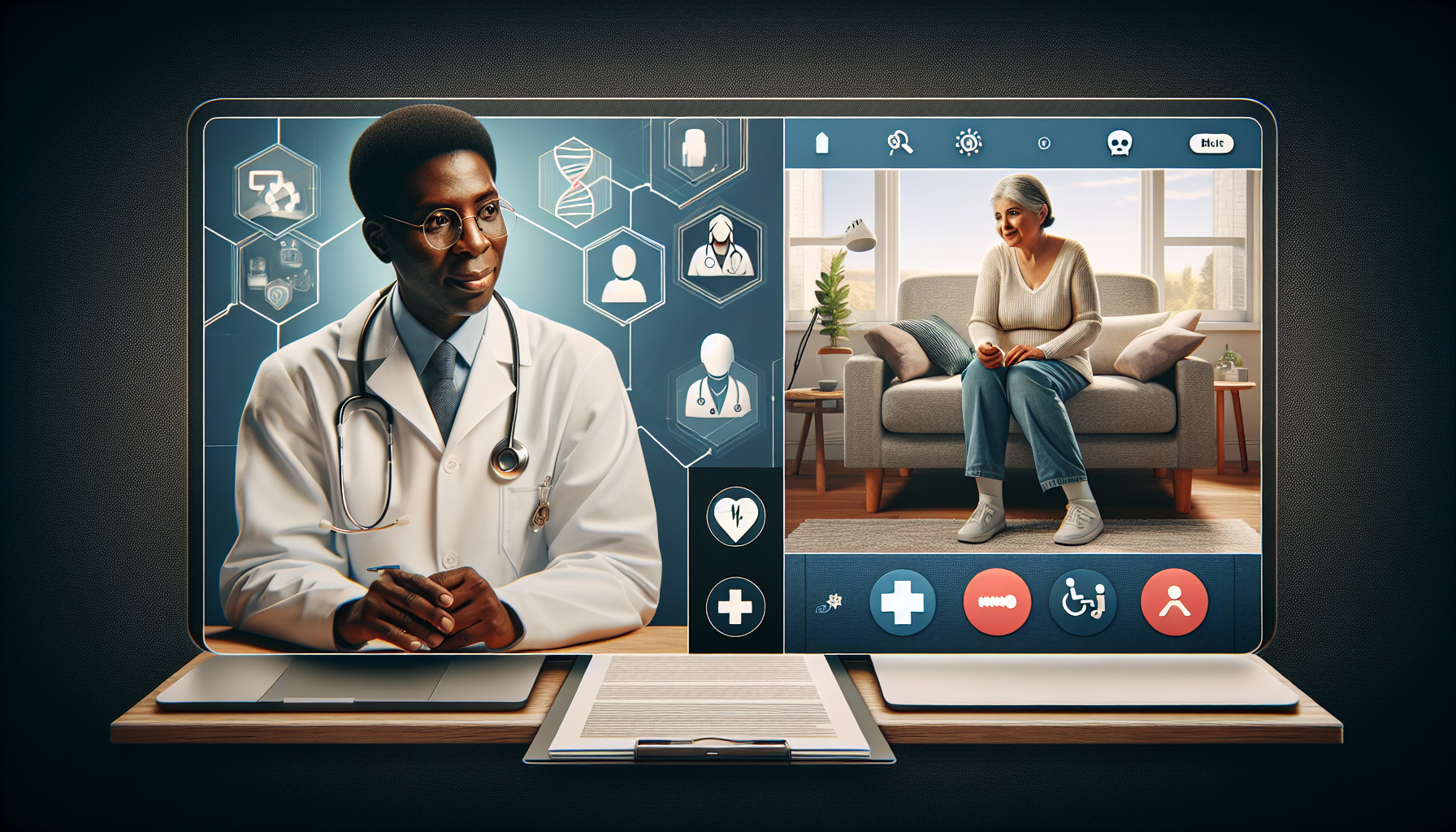The Intersection of Technology and Compassion in Healthcare Careers

Telehealth has emerged as a critical component of modern healthcare, breaking geographical barriers and expanding access to underserved populations. According to a report by the U.S. Department of Health and Human Services, telehealth services surged during the COVID-19 pandemic, with a 154% increase in telehealth visits in March 2020 compared to the previous year. Carenet Health adeptly transitioned to virtual consultations during this period, ensuring that patients continued to receive care while prioritizing their safety. This adaptation not only maintained continuity of care but also showcased how technology can facilitate meaningful interactions between patients and providers.
Enhancing Patient Outcomes with AI and Data Analytics
Artificial intelligence and data analytics have become invaluable tools in improving patient outcomes. Predictive analytics, for example, can identify patients at risk for chronic conditions, allowing healthcare providers to intervene early. A study published in the journal Health Affairs found that AI-driven algorithms significantly improved diagnostic accuracy and treatment planning. Yet, the effectiveness of these tools relies heavily on healthcare providers’ ability to interpret data empathetically. The human element in these interactions plays a vital role in ensuring that patients feel supported and understood.
Streamlining Information Sharing through Electronic Health Records
Electronic health records (EHRs) have revolutionized how patient information is shared among healthcare providers. By digitizing patient data, EHRs streamline the information-sharing process, reducing errors and improving coordination of care. However, while EHRs enhance efficiency, they also require healthcare professionals to maintain a personal touch when discussing sensitive information with patients, reinforcing the importance of compassion in patient care.
The Human Element in Patient Care
Empathy and effective communication are critical components of patient care. Research from the Journal of Patient Experience indicates that patients who feel understood and valued report higher satisfaction levels and better health outcomes. Healthcare professionals play a vital role in building trust with patients, as the relationship between provider and patient significantly impacts treatment adherence and overall satisfaction.
Case Studies Highlighting Compassionate Care
Carenet Health's approach emphasizes the importance of compassionate patient interactions. For instance, testimonials from patients who received follow-up calls after hospital discharge illustrated how healthcare providers' empathetic communication made a significant difference in their recovery process. These case studies serve as powerful reminders of the impact of compassion in healthcare.
Training and Development for a Technology-Driven Future
As technology continues to evolve, so too does the skill set required for healthcare professionals. Technical competencies in areas such as telehealth platforms and data analytics are essential, but soft skills like active listening and emotional intelligence are equally important. Carenet Health recognizes this need and has implemented training programs that foster both technical and interpersonal skills.
Continuous Learning and Adaptability
The rapid pace of technological advancement necessitates a commitment to continuous learning and adaptability. Healthcare professionals must stay updated on emerging technologies while also honing their ability to connect with patients. Carenet Health’s initiatives include ongoing training workshops that emphasize the importance of both hard and soft skills, ensuring that employees are well-prepared for the challenges of a technology-driven healthcare landscape.
Real-World Applications: Carenet Health's Approach
Carenet Health exemplifies the successful integration of technology and compassion in healthcare. For example, their use of AI-driven tools to analyze patient data is complemented by healthcare providers who communicate findings with empathy and understanding. Employees report that these interactions enhance patient experiences and contribute to a more positive work environment.
Innovative Projects at Carenet Health
Carenet Health has launched several innovative projects that exemplify this integration. One such initiative is their virtual care program, which combines telehealth consultations with follow-up support from care coordinators. This program ensures that patients receive ongoing assistance while allowing healthcare professionals to build meaningful relationships with their patients. Testimonials from both patients and providers highlight the positive impact of this approach on overall patient satisfaction and health outcomes.
The intersection of technology and compassion in healthcare is not merely a trend; it is a necessity for the future of healthcare careers. As innovations continue to emerge, healthcare professionals must adapt and embrace these technologies while preserving the core values of empathy and communication. Carenet Health serves as a model for others in the industry, demonstrating that it is possible to achieve a balance between technological proficiency and human connection.
Telehealth Coordinator
Carenet Health, Teladoc Health, MDLive
Core Responsibilities
Manage scheduling and logistics for virtual patient consultations, ensuring seamless communication between patients and healthcare providers.
Collaborate with IT teams to troubleshoot technical issues and enhance user experience on telehealth platforms.
Provide training and support to healthcare staff on telehealth best practices.
Required Skills
Strong organizational and multitasking abilities to coordinate various aspects of telehealth services.
Proficiency in telehealth software and knowledge of HIPAA regulations.
Excellent communication skills to effectively interact with patients and healthcare staff.
Health Data Analyst
Health systems, insurance companies, clinical research organizations (CROs) like Covance
Core Responsibilities
Analyze patient data to identify trends and insights that can improve patient outcomes and operational efficiency.
Collaborate with healthcare providers to develop predictive models for at-risk patient populations.
Present findings to stakeholders, translating complex data into actionable strategies.
Required Skills
Proficiency in statistical software (e.g., SAS, R, or Python) and data visualization tools (e.g., Tableau).
Strong analytical thinking and problem-solving skills to interpret data meaningfully.
Familiarity with healthcare regulations and standards, including HIPAA compliance.
Patient Care Advocate
Patient advocacy organizations, hospitals, and integrated healthcare systems like Carenet Health
Core Responsibilities
Serve as a liaison between patients and healthcare providers, ensuring that patient needs and preferences are understood and respected.
Assist patients in navigating the healthcare system, including scheduling appointments and understanding treatment options.
Conduct follow-up calls to assess patient satisfaction and provide additional support as needed.
Required Skills
Excellent interpersonal and communication skills to foster trust and rapport with patients.
Strong problem-solving abilities to address patient concerns effectively.
Knowledge of healthcare policies and insurance processes to assist patients comprehensively.
Health Informatics Specialist
Hospitals, healthcare technology companies, universities with health informatics programs
Core Responsibilities
Design and implement electronic health record (EHR) systems that enhance data sharing and improve patient care.
Train healthcare staff on effective EHR utilization while ensuring compliance with data privacy regulations.
Analyze health data to inform decision-making and optimize patient care delivery.
Required Skills
Strong technical skills with EHR systems (e.g., Epic, Cerner) and an understanding of clinical workflows.
Background in health informatics or a related field, with knowledge of healthcare regulations.
Problem-solving abilities and attention to detail for effective database management.
Remote Care Coordinator
Home health agencies, telehealth providers, integrated healthcare systems like Carenet Health
Core Responsibilities
Provide ongoing remote support for patients with chronic conditions, helping to manage their health and treatment plans.
Utilize telehealth technologies to conduct regular check-ins and monitor patient progress.
Collaborate with healthcare teams to coordinate care transitions and follow-up services.
Required Skills
Strong communication skills to foster relationships with patients and healthcare providers.
Familiarity with remote monitoring tools and telehealth platforms.
Ability to interpret clinical data and understand treatment protocols.


